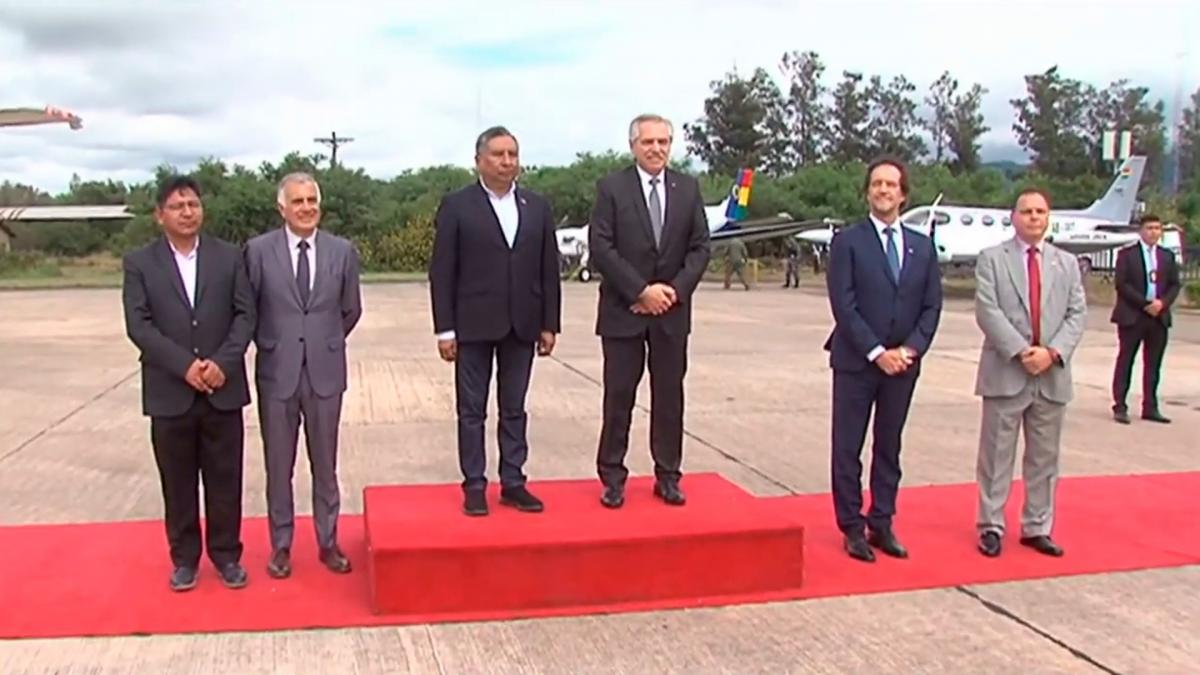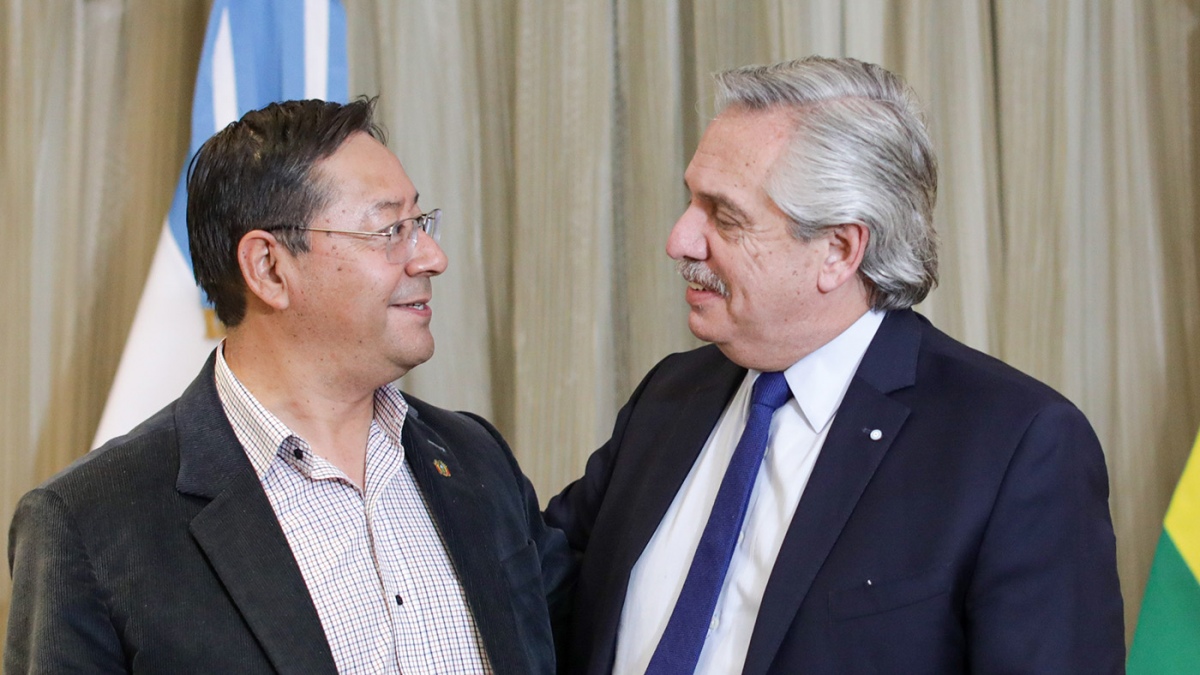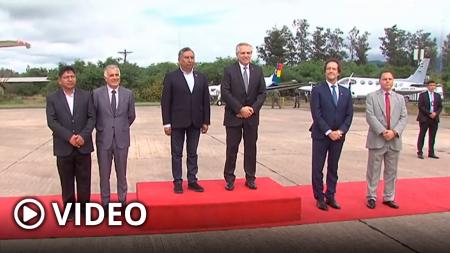Arrival of President Alberto Fernández and his delegation to the city of Yacuiba, Bolivia
VER VIDEO
President Alberto Fernández arrived this afternoon in the Bolivian city of Yacuiba to inaugurate with his counterpart Luis Arce in the town of Yaguacua the “Juana Azurduy de Padilla” electroduct, the first electrical link between the two countries that will improve the electrical supply and favor the supply to the populations of border areas.
This is the first work in terms of international electrical interconnection, through which Bolivia will be able to connect to the high-voltage transmission system and stop being the only neighboring country that was not incorporated, it was officially reported.
The agenda
He President Alberto Fernández will inaugurate this Thursdayalong with his Bolivian counterpart, Luis Arce, the Juana Azurduy electroduct in the Bolivian town of Yaguacuawhere it will work “the first electrical link between the two countries that will improve the electrical supply and favor the supply to the populations of border areas”, according to official sources.
During the act, the first international electrical interconnection will be put into operation that will allow Bolivia to connect to the high voltage transmission system of Argentina and stop being the only neighboring country that was not incorporated.
For Argentina, “the import of energy from that neighboring country results in an improvement in voltage levels in the northern area of the NOA, especially in hours of high demand,” according to government sources.
 Video capture.
Video capture.
The heads of state, who this Tuesday shared the Unasur meeting that took place in Brasilia, will meet again to present aA work that, with Bolivian investment, will facilitate the purchase and sale of electricity in the region.
In addition to the substation on the Bolivian side, The laying of more than 100 kilometers of cables capable of transporting 132 kilowatts to Tartagal, Salta province will be inaugurated.
“Today Bolivia has a surplus of 1,500kw per day that it is interested in selling. A part will be able to sell it to Argentina and the interconnected countries,” the national ambassador in La Paz, Ariel Basteiro, explained in dialogue with Télam from Bolivia.
In that sense, Bolivia will join the system that allows electricity exchange with Argentina, Uruguay, Paraguay and Brazil.
Argentina, for its part, will be able to access Bolivian energy for the north of Salta and will be able, if necessary, to send energy to the neighboring country.
The relationship between the two countries has energy as its central axis and had a notable point last winter when Arce visited Casa Rosada to finalize the sale of gas to Argentina that was originally destined for Brazil.
“The relationship with Bolivia has been, to a large extent, gasified in the last 20 years. Argentina bought gas for its industry and this situation is one of the keys to Bolivian economic development during those years,” said the ambassador.
However, for various reasons, gas reserves dwindled and Bolivia currently exports “half of what it sold to Argentina,” according to Basteiro.
 Arce and Fernández in one of their previous meetings. /Photo: Presidency.
Arce and Fernández in one of their previous meetings. /Photo: Presidency.
sending arms
Regarding the bilateral agenda, consulted by the case on the alleged shipment of arms to Bolivia from Argentina during the coup against Evo MoralesBasteiro pointed out that the case is advancing in the courts of that country while “nothing was done” in the Argentine justice system.
“In Bolivia, the expert reports on the two notes that were found were completed, the one requesting weapons and the one thanking. We believe that the one that originally existed was the one thanking and that later the other was made to make it more verbose,” he commented. the diplomat.
Basteiro explained that the case will reach an oral trial in the Bolivian courts and criticized the inaction of the Argentine justice that “did nothing.”
“The judge summoned the gendarmes who traveled, but did not do the same with those actually responsible,” he stressed.
The Latin American agenda
The visit to Bolivia will culminate a week in which President Fernández dedicated himself to the Latin American agenda: on Monday he received the president-elect of Paraguay, Santiago Peña, in Olivos, and on Tuesday he was in Brazil to participate in the summit of South American presidents that seeks to put Unasur back into operation.
On Tuesday, in Brasiliia, Fernández called on the South American countries for regional unity to face “the new dimension of globalization” and to guarantee a zone of peace to create their own defense system, instead of receiving the influences of the Southern Command of the United States Armed Forces.
This was stated during his speech at the summit of South American presidents held at the Itamaraty Palace, the headquarters of the Brazilian Foreign Ministry, convened by the host, Luiz Inácio Lula da Silva, as part of the efforts to revive the Union of South American Nations ( Unasur).
In that sense, President Fernández ratified the need for union in regional mechanisms to face what he called the “new globalization” and criticized the dismantling of the South American zone caused by the US government of Donald Trump and the creation of the Lima Group.
During his visit to Brasilia, Fernández also received the notification from Lula da SIlva that there are no more legal obstacles to financing with the development bank BNDS for the construction of phase 2 of the construction of the Néstor Kirchner Gas Pipeline, that will reach the Brazilian south.
According to a statement from the Brazilian Foreign Ministry, in the bilateral meeting held in Brasilia with Fernández on the sidelines of the South American summit, Lula indicated that “at this moment, there are no legal obstacles to the intervention of the BNDES and that Brazil will advance in financing to allow the export of Brazilian products.”
Meanwhile, President Fernández celebrated the meeting with Lula on his Twitter account and noted that progress was made “on strategic issues such as BNDES financing for exports of steel tubes and sheets that will be used in the second stage of construction of our Nestor Kirchner gas pipeline”.
“This will allow our country to achieve energy self-sufficiency and export gas from Vaca Muerta to Brazil. In addition, we are taking fundamental steps to deepen our energy integration. Argentina will improve the payment conditions for electrical energy imports from thermal sources,” he explained. the head of state.


